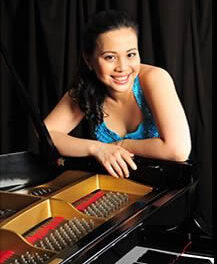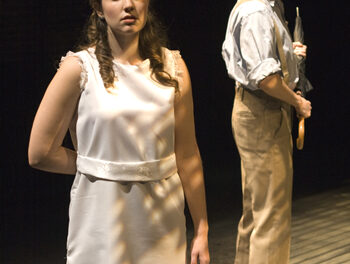What state of affairs could possibly enhance a beautiful autumn afternoon in North Carolina? The answer was obvious for those who attended the ECU Symphony Orchestra concert in Wright Auditorium. Judging from the appreciative response of the audience, the program’s romantic, virtuosic, and familiar elements were well matched to the youthful vitality of the student musicians and their faculty collaborators.
The first work, Romance in C, Op. 42,by Jean Sibelius, is a beautiful piece colored by modal mixture, a rather surprising element in light of the prosaic title key. The scoring is for strings only, and the ensemble responded warmly to the artful direction of student assistant conductor Rafael Valle. The orchestra is blessed with a full complement of double basses this year – seven in all – and their deep sonority, first evident in this work, lent a gratifying solidity to the orchestra throughout the concert.
The most spectacular performance of the afternoon was by Dr. Henry Doskey, chair of the School of Music’s keyboard department, with the orchestra under the direction of Dr. Jorge Richter in a brilliant rendition of Franz Liszt’s Piano Concerto No. 2 in A, G.124. The six movements are played attacca, without pause, and the music exhibits Liszt’s procedure of thematic transformation. In terms of his writing for the piano, the composer explores its use not solely as a solo instrument, nor, as in many of his works, as a vehicle for the exhibition of virtuosity – although the considerable difficulty of this work is evident — but as a partner, and at times even an accompaniment, to the orchestra.
Dr. Doskey has a distinguished international career as a performer, recording artist, and teacher, and it is for good reason he has a faithful following in eastern North Carolina. A member of the orchestra, asked his favorite piece of the day, responded without hesitation: “The Liszt! Dr. Doskey’s playing is so effortless – it is such a joy to play with him!” The impressive performance met with hearty applause, a standing ovation, and comments such as: “Masterful!” “This is the best game in town – more people need to know about it!”
Symphony No. 6 in F, Op. 68, “Pastoral,” by Ludwig van Beethoven, followed intermission, with Dr. Richter conducting. The tempos were very good, the dynamics excellent, and there were some pleasant interpretive surprises. In sum, the performance was fulfilling, in almost all points meeting or exceeding this listener’s expectations.
This year’s ECU Symphony Orchestra season includes favorite masterworks as well as world premières of works by ECU School of Music professors Drs. Mark Taggart and Edward Jacobs (December 2 and February 28). Guest soloist Dr. Keiko Sekino will perform Beethoven’s Concerto for Piano in C minor, Op. 37, on February 9. On April 25 guest conductor Dr. Daniel Bara, the orchestra, and combined ECU vocal ensembles will present Johannes Brahms’ A German Requiem. Antonin Dvorak’s Symphony No. 9, “From the New World” is the work to be featured at the next concert, Wednesday, December 2, 8 o’clock p.m.












